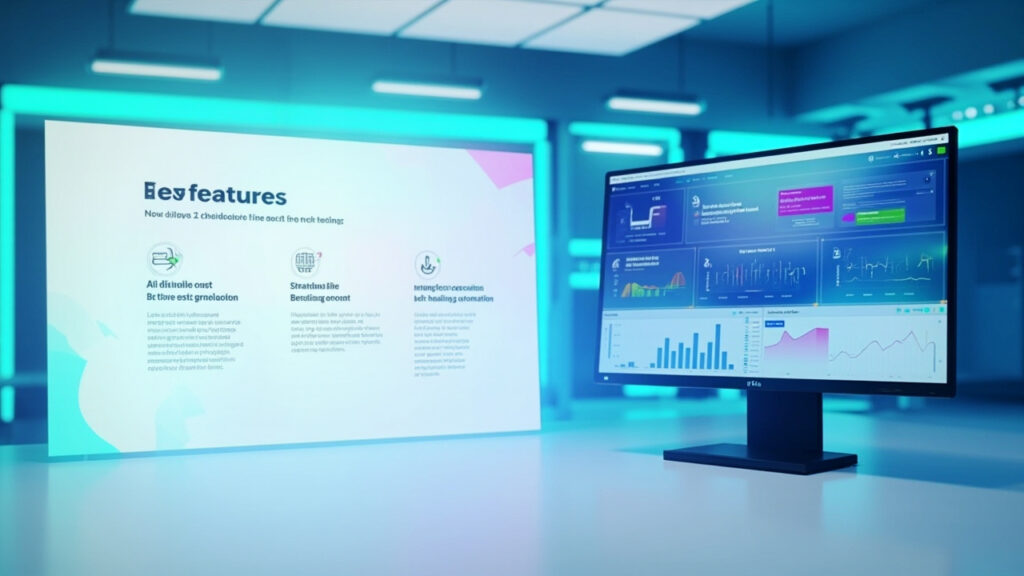In the rapidly evolving world of software development, the pressure to release high-quality, bug-free applications quickly is more intense than ever. Traditional software testing methods, while reliable to a degree, are increasingly seen as too slow and cumbersome, struggling to keep pace with the demands of modern development practices such as Agile and DevOps. This challenge has pushed the industry towards innovations that can streamline testing processes and enhance the accuracy and efficiency of test results.
As software complexity continues to escalate and user expectations for seamless functionality intensify, the role of advanced technological solutions becomes undeniable. In this blog post, we will explore how cutting-edge tools, especially AI-driven platforms like GenQE, are redefining the landscape of software testing. By integrating intelligent testing solutions, businesses can not only accelerate their development cycles but also significantly improve software quality and reliability.
Read on to discover how embracing these technologies can transform your software testing processes, ensuring your applications are not only functional but also align with the high standards your users expect. We’ll delve into the mechanics of modern software testing, the pivotal role of AI in overcoming traditional testing challenges, and how tools like GenQE can be seamlessly integrated into your testing strategy to deliver superior results.
The Evolution of Software Testing

Software testing has undergone a significant transformation over the past few decades. Initially, the process was predominantly manual, requiring extensive human effort and often resulting in lengthy development cycles. However, the advent of automation tools brought a new level of efficiency, reducing the time and manpower needed for tests.
The Shift from Manual to Automated Testing
In the early days, testers relied heavily on manual processes which were not only time-consuming but also prone to errors. As software applications grew in complexity, it became clear that manual testing couldn’t keep up. This necessity drove the development of automated testing tools, which helped streamline the execution of repetitive test cases and improved the consistency of testing outcomes.
Integration with Agile and DevOps
The rise of Agile methodologies and DevOps practices marked another pivotal shift in software testing. These frameworks emphasized continuous integration and continuous delivery, requiring testing to be more flexible and integrated into every stage of the software development lifecycle. Automation became a cornerstone of this integration, enabling faster feedback loops and more agile response to issues.
The Advent of AI in Testing
Artificial intelligence has started to play a crucial role in further enhancing testing efficiency and effectiveness. AI-driven testing tools can predict potential problem areas, optimize test cases, and even learn from previous data to improve future tests. This capability not only speeds up the testing process but also enhances its accuracy, making it a critical component of modern software testing strategies.
Challenges in Contemporary Software Testing

Despite advancements, several challenges persist in software testing that can hinder the development process and jeopardize the quality of the product.
Handling Increasing Complexity
Modern software applications are more complex than ever, integrating multiple layers of functionality and operating across various environments. This complexity makes comprehensive testing challenging, as testers must cover a vast array of scenarios to ensure the application performs well in every possible situation.
Keeping Pace with Rapid Development Cycles
In an era where time to market can be a critical competitive edge, development teams are under immense pressure to accelerate their release cycles. This need for speed can often come at the expense of thorough testing, potentially leading to product issues post-launch.
Ensuring Accurate and Efficient Test Coverage
Achieving high test coverage—that is, ensuring that all aspects of the application are tested—is crucial for uncovering potential defects. However, manually designing tests that cover every possible interaction can be nearly impossible without substantial time and resources.
The Role of AI in Enhancing Software Testing

Artificial intelligence is poised to address many of the challenges faced by traditional testing methods. AI can automate complex tasks, predict outcomes, and learn from each testing cycle to enhance accuracy and efficiency.
AI-Driven Test Case Generation
One of the most time-consuming aspects of testing is creating comprehensive test cases that cover all possible user interactions. AI can automate this process by analyzing application data and user behavior to generate relevant test cases, dramatically reducing the manual effort required and ensuring broader coverage.
Predictive Analytics in Testing
AI algorithms can analyze historical data and predict where issues are most likely to occur. This predictive capability allows testers to focus their efforts more strategically, improving the effectiveness of testing programs and helping prevent defects from making it to production.
Real-Time Adaptation and Learning
AI-driven tools continuously learn from ongoing development cycles. This means they can adapt to changes in the application and the environment it operates in, ensuring that the testing process remains robust over time.
Introducing GenQE: A Paradigm Shift in AI-Powered Testing

As we delve into the specifics of how AI is revolutionizing software testing, let’s explore GenQE—a platform that exemplifies the integration of AI in quality assurance. GenQE stands out by offering a suite of features that not only streamline the testing process but also enhance its effectiveness by leveraging machine learning and intelligent automation.
Comprehensive Features of GenQE
- **AI-Driven Test Generation:** GenQE automates the creation of detailed test cases based on an in-depth analysis of software requirements and user data. This not only saves time but also ensures that no critical scenarios are overlooked.
- **Smart Test Execution:** By prioritizing test cases based on risk and potential impact, GenQE helps teams focus their efforts where they are most needed, enhancing the efficiency of the testing process.
- **Self-Healing Automation:** GenQE reduces the need for ongoing test maintenance by automatically adjusting test scripts to accommodate changes in the application, such as updates to the UI.
These features demonstrate how GenQE not only keeps pace with but also enhances the capabilities of modern software testing strategies, making it an invaluable tool for developers aiming to improve their QA processes and product quality.
Leveraging GenQE in Your Testing Strategy

Integrating GenQE into your existing software testing strategy can dramatically improve the efficiency and effectiveness of your tests. Here’s how you can leverage this powerful tool:
Streamlining Test Automation
By automating the creation and execution of test cases, GenQE can help reduce the workload on your QA team, allowing them to focus on more critical tasks. This not only speeds up the testing process but also reduces the potential for human error.
Enhancing Test Coverage and Accuracy
GenQE’s advanced algorithms ensure that all aspects of an application are thoroughly tested, increasing the likelihood of detecting defects before the software goes live. This comprehensive coverage is crucial for maintaining the integrity of complex modern applications.
Integrating with DevOps Practices
GenQE seamlessly integrates with popular CI/CD tools, making it an ideal choice for teams practicing DevOps. This integration helps maintain a continuous testing environment that supports rapid development cycles and high-quality outputs.
Case Studies: GenQE in Action
To better understand the impact of GenQE, let’s consider a few case studies where it has been successfully implemented:
Case Study 1: E-commerce Platform
An e-commerce company used GenQE to automate its testing processes, resulting in a 50% reduction in time-to-market for new features. The platform’s AI-driven test generation and execution capabilities allowed the company to maintain a high level of quality, even as the complexity of their application increased.
Case Study 2: Financial Services Application
A financial services firm implemented GenQE to enhance the accuracy of its testing efforts. By leveraging the tool’s predictive analytics and risk-based test prioritization, the firm was able to identify and resolve potential issues before they affected users, significantly reducing the incidence of critical defects.
These examples highlight the practical benefits of integrating GenQE into different industrial contexts, demonstrating its versatility and effectiveness in enhancing software quality.
Conclusion: Embracing the Future of Testing with AI

The landscape of software testing is continually evolving, with AI and machine learning at the forefront of this transformation. Tools like GenQE represent the next generation of testing solutions—intelligent, efficient, and capable of handling the complexities of modern software development.
For organizations looking to enhance their testing strategies, adopting AI-powered tools is not just an option; it’s becoming a necessity. As we’ve seen, the capabilities of platforms like GenQE can significantly improve test coverage, accuracy, and efficiency, ultimately leading to better software products and faster development cycles.
If you’re ready to take your software testing to the next level, exploring AI-powered solutions like GenQE could be the key to unlocking greater potential in your development processes. Embrace the future of testing and ensure your applications are not only functional but flawless.
Discover More Innovative Solutions
Want to learn more about the tools and technologies discussed in this article? Explore how these innovations can be tailored to your specific needs and workflow requirements.
Our team of experts is available to answer your questions and provide personalized insights into how modern solutions like GenQE can address your specific challenges.